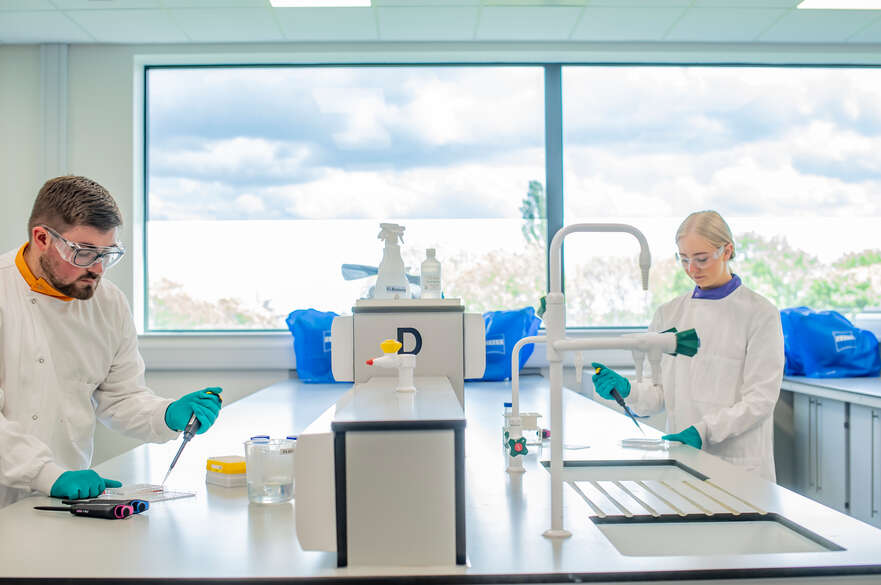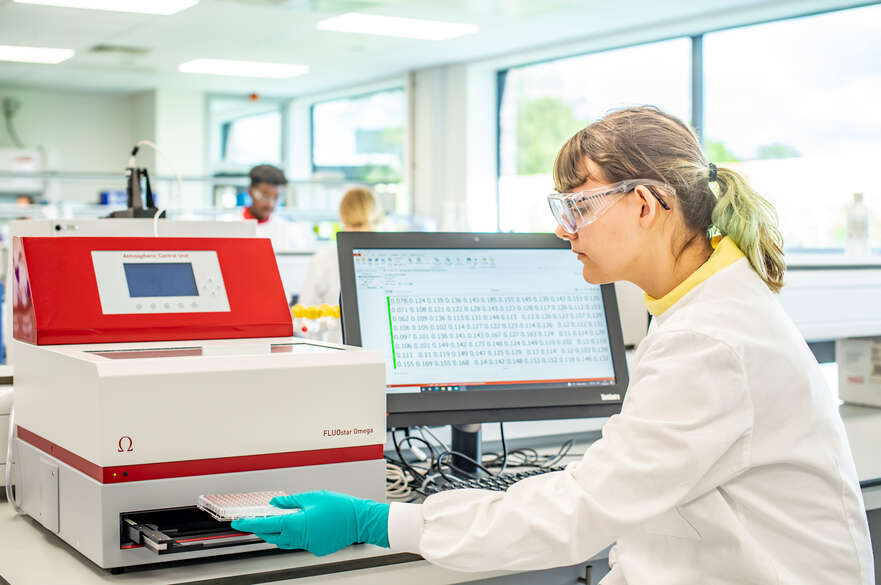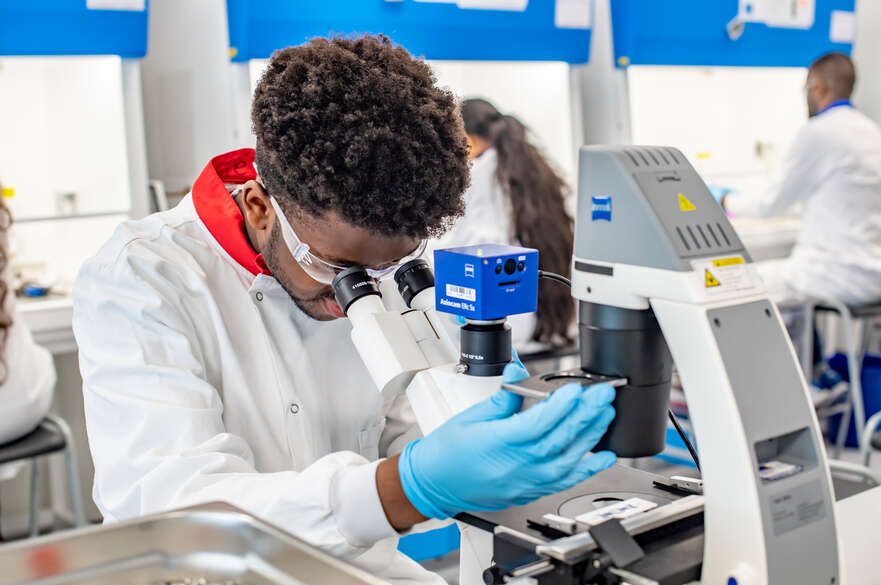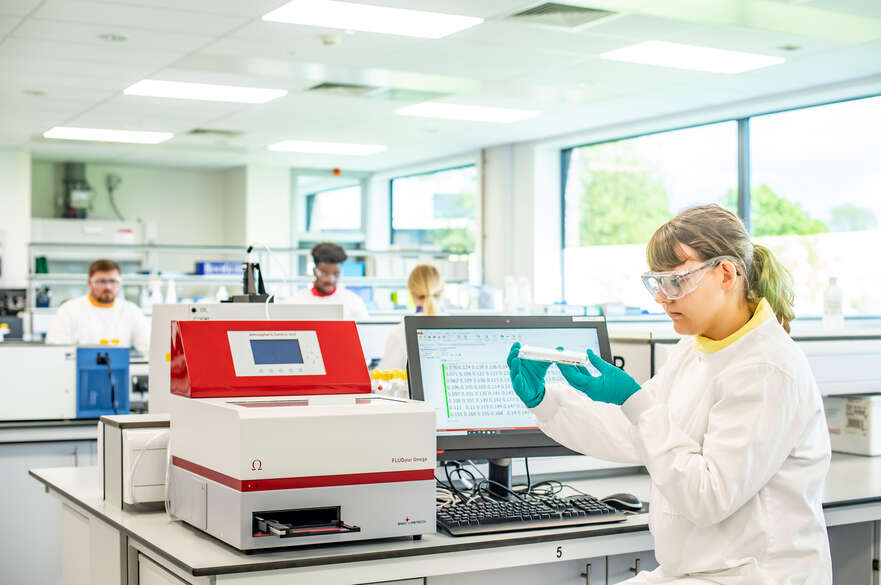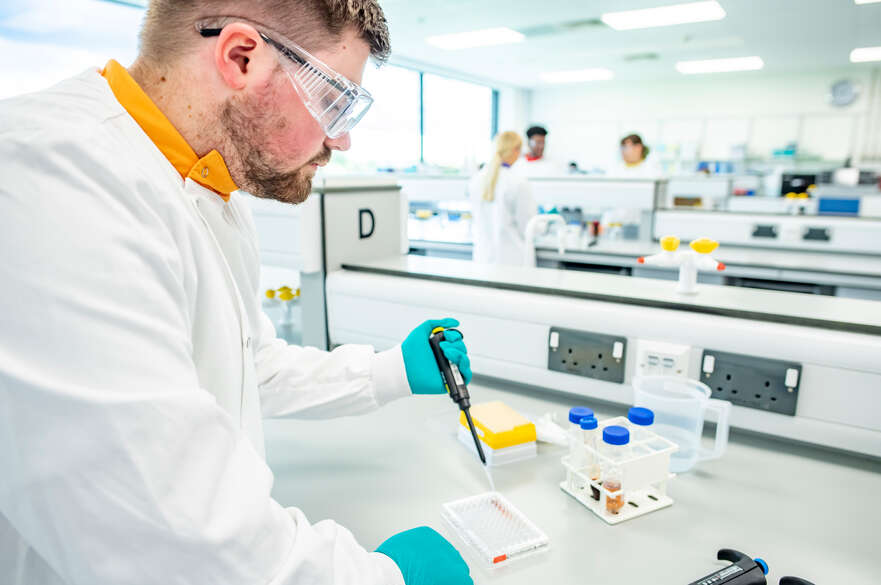Beat the Clearing queue
About this course
This course is an integrated foundation degree, where you'll progress onto our BSc (Hons) Biological Sciences course, once you successfully complete your foundation year.
Our integrated foundation degrees offer a gateway to our BSc courses for those who currently don't meet the degree-level entry criteria. The foundation year acts as a launch pad, supporting you with the transition to university learning. Anticipate a year filled with the development of robust study skills, increased confidence in tackling intricate problems, and the cultivation of independent learning. Rest assured, by the end of this transformative year, you'll emerge well-prepared for the exhilarating challenges that await you at degree level.
If you change your mind at the end of your foundation year you can transfer onto one of our other BSc Bioscience courses at NTU.
Why study Biological Sciences at NTU?
Why settle with one plan when you can explore your entire passion?
Take your degree anywhere you want by choosing specialist modules – that could be focusing on microbiology, environmental biology, neuroscience, physiology, or biochemistry. This will enable you to build your confidence to become a professional biological scientist. You’ll gain hands-on experience in our labs, on field trips, and through projects that mirror the work environment.
You’ll investigate, you’ll collaborate, and you’ll gain experience - in our labs, on field trips, and through projects that mirror the work environment.
Research-informed teaching
Our research is tackling real-world issues – and the people working on this research will be teaching you. This means you can be sure that what you are learning is frontier of new biological discoveries. For example, Dr Axel Barlow, our molecular ecology, and animal evolution expert, has used his expertise to uncover the secrets of the dwarf elephant which became extinct about 19,000 years ago.
During your last year research project, you will work closely with a member of staff on their area of expertise. They may ask for your help to develop a new idea that could be used in future research or teaching. You will be working on real-world problems and gaining a valuable experience at the same time.
Work-like experiences
You’ll design your own experiments in group work and put them to the test in both laboratory and field learning environments. Developing problem-solving skills by trial and error are important graduate-level skills, and we make sure you gain this experience from the very beginning of your degree. We’ve also incorporated employability skills into the curriculum, so you not only learn theory and skills, but you also know how to find and apply for your dream job.
Take a work placement
Your work placement is a great opportunity to not only learn how to do the job, but also to gain an understanding of the industry and what it takes to be successful. Our strong industry connections and the support of our Employability team will give you the tools you need to make the most of your placement experience.
You'll be supported throughout your placement year and will write a reflective report and diary during your placement. When you successfully complete your placement, you will be eligible to receive an additional award of a Diploma in Professional Practice.
Develop your portfolio
At NTU, you'll have the opportunity to create a skills portfolio. This is where you'll keep evidence of all the techniques and skills you've mastered while you are here with us. It is also a valuable tool when you graduate, it will allow you to show future employers that you possess all the skills to work in a professional environment.
Meet our staff
Our experienced teaching and technical team come from diverse backgrounds, so whether your interests lie in research or industry, we have the team to support you. For example, in addition to teaching, Dr. Peter Redfern is Managing Director at Loreus Ltd., an environmental consultancy and training provider. Carlos Abrahams is also a Technical Director at Baker Consultancy, an ecology consultancy.
They will ensure that you are taught up-to-date theory and practices in your chosen field of biological science. Our excellent relationships with professionals in the industry will also help us secure high-quality placements and guest speakers.
What you’ll study
In your first year, you'll dive into foundational modules that build a strong understanding of biological sciences. In later years, you can choose specialized modules that align with your career goals. It can be difficult to know where you want to be after graduation, but we'll provide you with the experiences and skills you need to pursue your chosen path. You'll also get the chance to work with various industries, not just traditional biosciences, like the motor industry. This experience will help you develop versatile skills, ready to progress to your full degree.
We want to help you build your professional identity, so we offer opportunities to work on industry challenges, debate current hot topics, build your portfolio, and take mock interviews. You'll learn how you work best in a team and even have a chance to deliver a Dragons' Den style pitch in your final year.
Study abroad opportunities
Get ready to embark on an adventure with our study abroad programs at partner universities or by getting a work placement overseas. Both opportunities will boost your employability, build lifelong friendships, and allow you to experience the world in a whole new way.
Applied Biology
Using case studies, you’ll consider the science and ethical considerations in bioscience and medical fields, research and therapeutics as well as topical issues in environmental science. In addition to exploring a variety of topics in health and disease such as infectious diseases inherited and non-inheritable disorders, you will touch on therapeutic approaches.
Data Handling and Analysis
This module will use group work and problem-based learning to give you a strong base of mathematical skills can be applied in biosciences. You’ll learn concepts such as rearranging equations, concentration calculations, metric prefixes, probabilities and exponentials through the lens of real-world biology labs and data analysis of disease scenarios.
Introductory Science for Biologists
This module focuses on the key scientific principles of physics and chemistry that are vital to Bioscientists. In the physics part of the module you’ll be introduced to topics such as wave motion, vibration and methods of heat transfer. The Chemistry part of the module covers some inorganic, organic and physical chemistry, providing biochemical foundation knowledge.
Foundation Biology
You’ll be introduced to core concepts across different areas of biology to ensure you have a broad core biology knowledge. Practical classes in our labs put the theory you’ve learned into context and you’ll also learn good laboratory practice, basic laboratory skills and problem-solving.
Professional Practice and Skills
Bioscientists require an understanding, and in many cases experience, of working in a laboratory environment. This module give you a chance to evidence your practical skills as well as drawing on topics and techniques used in other modules. You’ll work on a group project that will give you experience of working on all elements of a project e.g. research , design, development, testing, evaluation and presentation.
Professional Skills Project
Bioscientists require an understanding and experience of working in a laboratory environment. This module emphasises learning professional lab conduct and brings together knowledge and techniques learned in your other first year modules.
Practical Techniques for Biology
Covers experimental design principles, data collection and analysis methods, and techniques such as centrifugation, chromatography, electrophoresis, microscopy, and radiobiology.
Biological Systems
This module will give you the knowledge and skill foundations for the rest of your course. You’ll also get an overview of the areas you can specialise in as you move through your course. Focusing on the structure and function of eukaryotic and prokaryotic cells you’ll discover the metabolic processes they conduct.
Introduction to Biochemistry
Learn about the key aspects of macromolecules, cell structure and function, and interrelationships in both practical and theoretical contexts.
Genetics and Immunology
You will develop genetic concepts and be introduced to the basic aspects of the immune system, including the molecules, cells and interactions involved.
Introduction to Physiology
You'll learn about the inner workings and physiology of human organ systems such as the respiratory, nervous, cardiovascular, urinary, endocrine, and muscular systems. Afterwards, you'll study homeostasis in depth.
Introduction to Microbiology
Explore different types of microbes, their function and purpose. Consider the significance of the microbial world, the biology of microorganisms, and medical, industrial, and environmental microbiology.
Core modules
Professional Skills for Bioscientists I
You’ll become a well-rounded bioscientist during your time at NTU. This module will provide you with work-experience-like opportunities to gain an understanding of the professional skills you need for your future career, right from the beginning of your studies. You will develop your practical design skills by working in a mini-team on a challenge set by an employer. You will also make an application for a mock job advert to not only practice your interview skills, but also to learn how to apply for your dream role.
Professional Skills for Bioscientists II
You'll continue exploring how communicating your knowledge to different audiences is key, building on the skills you learned in Professional Skills for Bioscientists I. This could involve developing your medical and science writing or looking at education and policy making where bioscience plays a role.
Bioscientists of the Future
In this module, you’ll get to work as a team to explore current hot topics such as sustainability, climate crisis, antimicrobial resistance, and population growth. An employer will set your group a challenge, and you’ll use a framework commonly used in industry to document your ideas and methods of analysis.
Biomolecular Structure and Function
Learn about the functions of polymerases, binding proteins, helicases, ligases, topoisomerases and promosomes in DNA replication as well as RNA polymerases.
Optional modules
Host-Pathogen Interactions
Explore how pathogenic organisms and their humans interact with each other and learn how this knowledge can be used to develop new drugs and vaccines.
Microbial Structure, Identification and Distribution
You'll look at the function of sub-cellular structures of micro-organisms and the classification and identification of the main groups of bacteria, fungi, and viruses particularly those relating to forensic investigations.
Ecosystems
On this residential field course, you will have the opportunity to grow your practical skills by characterising plant and animal biodiversity in various habitats and ecosystems. You will also be assessing sites for their wildlife and conservation value.
Biodiversity and Evolution
Classifying life on earth is a significant part of biosciences. Discover how we can study biodiversity in the lab through molecular and ecosystem-level approaches. You'll also explore how key theories of evolution help us to understand the structure and function of the natural world in the past, present, and future.
Neuroscience
Discover the functions of different brain regions and neuronal cell types and relate them to more advanced brain activities and neuronal functions.
Physiology
Covers the concepts of physiological control systems and demonstrates how changes in cellular and systemic function are linked together.
Molecular Genetics of Human Diseases
You will develop knowledge and understanding of gene therapy and all its complexities.
Metabolism and its Control
Explore the main pathways of oxidative catabolism and anabolism of carbohydrates and fats in eukaryotic cells, as well as the biochemical foundation of cellular signal transduction.
Core modules
Research Project
Develop your skills as an independent researcher by completing a 40 credit point research project under the supervision of one of our academic staff, in an area of their expertise.
Applied Bioinformatics
Use advanced bioinformatics methods to understand and identify the role that gene and protein biomarkers play in disease. Examine real clinical data and model diverse scenarios that forecast the clinical effect of the disease.
One Health
You’ll work on a team challenge to come up with creative solutions to real health-related problems, such as healthy ageing and the environment. Your team will present your idea in a dragons' den style presentation to a panel of employers and members of the public.
Optional modules
Infectious Diseases and their Control
Learn about the worldwide importance of infectious diseases, their effect on individuals and communities, and how to control them.
Immunology and Virology
Explore advanced concepts in immunology, including immune responses to infection, cancer, and autoimmunity. You will also study molecular biology of viral infections.
Tackling the Biodiversity Crisis
Biodiversity is declining at a faster rate than any other time in human history. In this module, you'll explore how humans have impacted our planet's air, water, and land. Then, you'll consider the sustainable solutions we can use to protect biodiversity and ecosystems as they respond to our rapidly changing world.
Adaptations and Survival
Investigate the scientific and philosophical issues surrounding sustainable development during. Working together, your group will research various options for a zero-carbon future and give a presentation.
Current Topics in Physiology
Discuss recent advancements in molecular, cellular and organ physiology. Learn about the research techniques used to study processes such as signalling, hormonal regulation and cardio-protection. By the end of this module, you will have a better understanding of how complex physiological systems work.
Current Topics in Neuroscience
Cover some of the most pressing topics in molecular and cellular neuroscience today, including learning and memory, stem cells, and the molecular basis of certain human neurological and psychiatric illnesses.
Cell Signalling and Cancer
Explore a range of thrilling topics on cell proliferation and cell death, including the cell cycle, the cytoskeleton and signal transduction. We'll also discuss their implications in carcinogenesis.
Developmental and Evolutionary Genetics
This module will introduce you to the concept of developmental biology, speciation, and evolution. You'll study the relationship between evolutionary and developmental genetics and focus on how the developmental processes evolved. Upon completion of this module, you will have a greater understanding of how species develop and change over time.
We regularly review and update our course content based on student and employer feedback, ensuring that all of our courses remain current and relevant. This may result in changes to module content or module availability in future years.
Don’t just take our word for it, hear from our students themselves
Video Gallery
How you're taught
You will typically study six modules in Year One and Two. Each module involves substantial amounts of practical work, in addition to lectures. In your final year you’ll study five modules and a research project. You will also take part in regular seminars and tutorials to support you with your studies.
Hands-on learning
You’ll learn through a mix of:
- lectures - covering the key theories
- seminars - smaller-group sessions perfect for learning key skills and collaborative working
- practical sessions - using our extensive range of industry-standard facilities
- workshops - this includes surgery sessions where you’ll meet with your lecturer in small groups to discuss any problems or work through challenging topics.
The rest of your time will be spent carrying out independent study such as reading textbooks and lecture notes, and working on exercises.
The course is very practical and you’ll spend lots of time in our industry-standard laboratories and depending on the modules chosen, in the field. This is because we believe the amount of time you spend getting hands-on experience is vital to prepare you for the world of work or research.
You’ll get to use our industry-standard equipment and techniques right from the very start of your course, such as spectrophotometers, centrifugation and gel electrophoresis. You’ll get to know how a professional lab works and how to follow laboratory processes and protocols used in industry – all valuable skills to have by the time you graduate.
We have a focus on using digital skills to support your learning in practical sessions. For example, you might do an online simulation of the experiment you are going to perform in the lab. This will get you familiar with the techniques and protocols, so that you can be confident and really make the most of your time in our labs. We give you access to e-learning resources too, to help you develop your lab skills outside of the lab environment.
Community and support
We will always be here for you throughout your studies with the help of your course leader, teaching team, personal tutor, and technical staff. You will also have regular tutorial sessions where you can meet with your personal tutor, in a small group, to talk about the topics you are learning, get ready for assessments, and get to know other students. Our policy is an open door, which means you can come and ask us any questions you have when you are on campus or send an email to get help when you are not on campus.
Course feedback is always welcome! You'll have plenty of opportunities to talk about your course, for example in your tutorial sessions, with your course leader and course reps. We even have an end-of-module survey for every module you study. We love to hear students’ feedback and how we can make improvements. Following our student’s feedback, we've recently brought in industry specialists to teach specific aspects of our environmental modules.
You'll also have support from your peers. Our mentoring schemes pair you up with another student who can give you support with your studies or university life in general. They've been in your shoes before and can offer a student's perspective. Find out more about the support you’ll receive at NTU.
Research informed teaching
Our research is tackling real-world issues – and the people working on this research will be teaching you. It also informs the subjects you’ll be studying with us so you can be sure your knowledge will be cutting-edge in your field. In the last Research Excellence Framework (REF 2021) - the UK's system for assessing the quality and impact of research in universities - we’re proud that 99% of NTU’s Allied Health Professions, Dentistry, Nursing and Pharmacy submission was assessed to be world-leading or internationally excellent.
Learn a new language
Alongside your study you also have the opportunity to learn a new language. The University Language Programme (ULP) is available to all students and gives you the option of learning a totally new language or improving the skills you already have. Find out more about the ULP.
How you're assessed
People excel in different ways, and we want everybody to have the best possible chance of success. That’s why we’ve adopted a range of assessment types, including:
- coursework, including group projects, case studies, dissertation and other assignments
- practical assessments, such as individual and group presentations, laboratory assessments and reports
- exams and tests, including formal exams, written tests and multiple-choice.
Careers and employability
Excellent placement opportunities
A placement is one of the best ways to prepare for your future career. Whether you choose a year-long placement or a shorter summer option, you’ll gain hands-on experience, apply your knowledge in a real-world setting, and develop the skills employers are looking for.
You can take a year-long sandwich placement with support from our expert Employability team. You’ll be guided throughout the process and complete a reflective report and diary. Successfully completing your placement earns you a Diploma in Professional Practice—a great addition to your CV. Students who take placements are twice as likely to secure a graduate job within six months.
Our biological sciences students have completed placements with leading organisations including the NHS, Campden BRI, The Open University, and the Health Protection Agency, in roles such as:
- Student Research Placement
- Junior Ecologist
- Trainee Biomedical Scientist (Microbiology)
Short summer placements are also available—a flexible way to explore different career paths, gain experience, and build your professional network. Recently students on this course have taken summer placements at NTU in our Department of Biosciences, working on research projects.
Find out more about work placements.
Your career development
Our graduates are highly sought after by employers because they leave the course with extensive practical experience and a strong background in scientific investigation and analysis.
Our recent graduates have secured roles at companies including:
- Anglian Water
- Source Biosciences
- NHS
- AstraZeneca
- Scientech Analytical Service
They have gone into a wide variety of job roles including:
- Graduate Ecologist
- Laboratory Scientist
- Research Scientist
- Research Microbiologist
- Technical Officer
Many graduates choose to undertake further study on one of our postgraduate courses or MPhil and PhD research degrees.
NTU Enterprise
You'll also have the opportunity to turn your ideas into a viable business with help from NTU Enterprise, NTU's purpose-built Centre for Entrepreneurship and Enterprise, a support centre to help students create, develop and grow their own businesses.
Campus and facilities
You’ll mainly be studying in the Interdisciplinary Science and Technology Centre (ISTeC) and Rosalind Franklin Buildings with access to facilities including our extensive SuperLab, with space for almost 200 students.
We have the stimulating and creative environment needed to equip students with the knowledge and transferable skills to put them ahead of the graduate crowd. We provide first class facilities that enhance the quality of our education and push the boundaries of our research, these include:
- a British Olympic Association-approved environmental chamber
- a crime scene house forensic-training facility
- a host of sporting clubs and societies to get involved in.
Our self-contained, community-focused Clifton Campus has been designed to keep students busy between lectures. Catch-up with your coursemates in the Pavilion’s barista café and Refectory; brainstorm group presentations in chic and stylish study spaces; enjoy some proper R&R in The Point, home of our Students’ Union. The campus also hosts the multimillion-pound Clifton Sports Hub, offering great options for everyone — whatever your interests, and however competitive you’d like to get!
You’re also right next to the bright lights of Nottingham — one of Britain’s top 10 student cities, and one of Europe’s top 25. All through termtime, a dedicated on-campus bus service will get you to the heart of the action (and back) in under 25 minutes. You’ll find a city stuffed with history, culture, and well-kept secrets to discover at your leisure: enjoy lush green spaces, galleries, hidden cinemas and vintage shopping by day, and an acclaimed food, drink and social scene by night.
Entry requirements
UK students
- Standard offer: 72 UCAS Tariff points from three A-levels or equivalent
- Other requirements: GCSE English and Maths grade C / 4
To find out what qualifications have tariff points, please use our tariff calculator.
Additional requirements for UK students
There are no additional requirements for this course.
Contextual offers
If you don’t quite meet our entry requirements, we might be able to make you a lower offer based on a range of factors, including your background (such as where you live and the school or college you attended), your experiences and your individual circumstances (you may have been in care, for example). This is called a contextual offer, and we get data from UCAS to help make these decisions. We do this because we believe everyone with the potential to succeed at NTU should have the opportunity to do so, no matter what barriers you may face.
Meeting our entry requirements
Hundreds of qualifications in the UK have UCAS Tariff points attached to specific grades, including A-levels, BTECs, T Levels and many more. You can use your grades and points from up to three different qualifications to meet our criteria. Enter your predicted or achieved grades into our Tariff calculator to find out how many points your qualifications are worth.
Other qualifications and experience
NTU welcomes applications from students with non-standard qualifications and learning backgrounds, either for year one entry or for advanced standing beyond the start of a course into year 2 or beyond.
We consider study and/or credit achieved from a similar course at another institution (otherwise known as credit transfer), vocational and professional qualifications, and broader work or life experience.
Our Recognition of Prior Learning and Credit Transfer Policy outlines the process and options available for this route. If you wish to apply via Recognition of Prior Learning, please contact the central Admissions and Enquiries Team who will be able to support you through the process.
Getting in touch
If you need more help or information, get in touch through our enquiry form.
International students
- Academic entry requirements: 72 UCAS Tariff points from three A-levels or equivalent. We accept equivalent qualifications from all over the world. Please check your international entry requirements by country.
- English language requirements: See our English language requirements page for requirements for your subject and information on alternative tests and Pre-sessional English.
Additional requirements for international students
There are no additional requirements for this course.
English language requirements
View our English language requirements for all courses, including alternative English language tests and country qualifications accepted by the University.
If you need help achieving the language requirements, we offer a Pre-Sessional English for Academic Purposes course on our City campus which is an intensive preparation course for academic study at NTU.
Other qualifications and experience
If you have the right level of qualifications, you may be able to start your Bachelors degree at NTU in year 2 or year 3. This is called ‘advanced standing’ entry and is decided on a case-by case basis after our assessment of your qualifications and experience.
You can view our Recognition of Prior Learning and Credit Transfer Policy which outlines the process and options available, such as recognising experiential learning and credit transfer.
Sign up for emails
Sign up to receive regular emails from the International Office. You'll hear about our news, scholarships and any upcoming events in your country with our expert regional teams.
Getting in touch
If you need advice about studying at NTU as an international student or how to apply, our international webpages are a great place to start. If you have any questions about your study options, your international qualifications, experience, grades or other results, please get in touch through our enquiry form. Our international teams are highly experienced in answering queries from students all over the world.
Policies
We strive to make our admissions procedures as fair and clear as possible. To find out more about how we make offers, visit our admissions policies page.
How to apply
Ready to join us? Then apply as soon as you can. Just click the Apply button at the top of the page and follow the instructions for applying. Make sure you check the entry requirements above carefully before you do.
Writing your application and personal statement
Be honest, thorough and persuasive in your application. Remember, we can only make a decision based on what you tell us. So include all of your qualifications and grades, including resits or predicted grades.
Your personal statement is a really important part of your application. It’s your chance to convince us why we should offer you a place! You’ve got 4,000 characters to impress us. Make sure you use them to show how your skills and qualities are relevant to the course(s) you’re applying for. For more hints and tips, take a look at our page on how to write a good personal statement.
Keeping up-to-date
After you’ve applied, we’ll be sending you important emails throughout the application process so check your emails regularly, including your junk mail folder.
You can get more information and advice about applying to NTU on our Your Application page. Good luck with your application!
You can apply for this course through UCAS. If you are not applying to any other UK universities, you can apply directly to us on our NTU applicant portal.
Application advice
Apply early so that you have enough time to prepare – processing times for Student visas can vary, for example. After you've applied, we'll be sending you important emails throughout the application process – so check your emails regularly, including your junk mail folder.
Writing your personal statement
Be honest, thorough, and persuasive – we can only make a decision about your application based on what you tell us:
Would you like some advice on your study plans?
Our international teams are highly experienced in answering queries from students all over the world. We also have members of staff based in Vietnam, China, India and Nigeria and work with a worldwide network of education counsellors.
- Complete this simple form to keep in touch with the International Office.
The University's commitment to delivering the educational services advertised.



